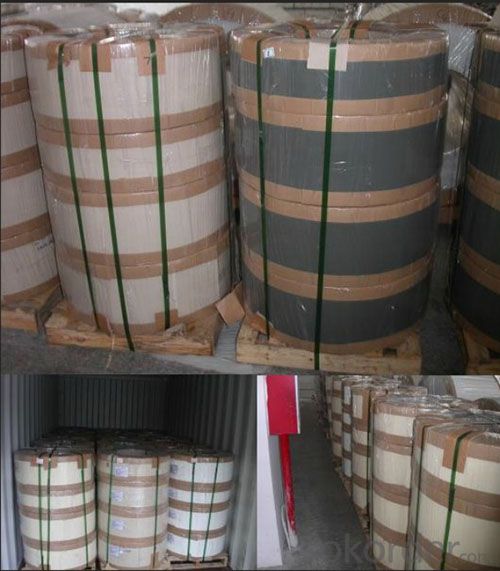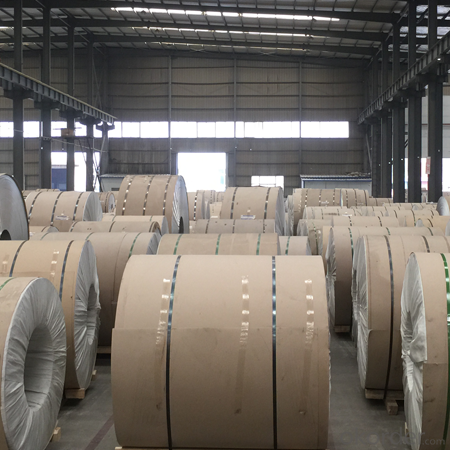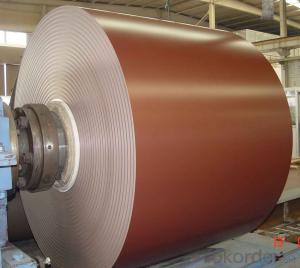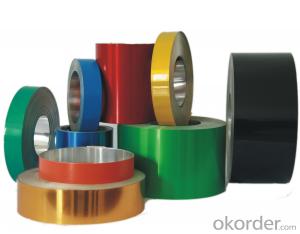Alloy 3003 PE Coated Aluminium Roll for Roofing/Ceiling/Gutter/Decoration
- Loading Port:
- Shanghai
- Payment Terms:
- TT OR LC
- Min Order Qty:
- 2 m.t.
- Supply Capability:
- 70000 m.t./month
OKorder Service Pledge
OKorder Financial Service
You Might Also Like
Item specifice
Alloy PE Coated Aluminium Roll for Roofing/Ceiling/Gutter/Decoration
Specification
Grade
| 1000 Series: 1050 1060 1070 1100 1200 1235 etc. 3000 Series: 3003 3004 3005 3104 3105 3A21 etc. 5000 Series: 5005 5052 5083 5086 5154 5182 5251 5754 etc. 6000 Series: 6061 6063 6082 6A02 etc. 8000 Series: 8006 8011 8079 etc. |
Thickness | 0.05~10mm |
Width | <1600mm< span=""> |
Color | Metallic, Solid, RAL or by customer requirements |
Coating paint: | PVDF(Polyvinylidene Fluoride), PE(Polyester ) |
Coating thickness | as per customer’s request |
Gloss | 10-90%(EN ISO-2813:1994) |
Total coating thick | Polyester18~25micron(EN ISO-2360:1995) PVDF25 ~35micron(EN ISO-2360:1995) |
Coating hardness | 2H |
Protective film | PVC film, Colorless transparent or White-black |
Adhesion | 5B (EN ISO-2409:1994) |
Impact resistance | No cracking and peeling (A.S.T.M D2794-1993) |
Flexibility (T-bend) | 0T- 2T |
Temper | H16, H18, H24, H26, H26 |
Certification | ISO9001:2000, CE, SGS |
Coil's standard diameter | 1100mm |
Inner Diameter | 405mm/505mm |
Coil's standard weight | 2000kgs |
Payment | L/C ,T/T |
Packing


FAQ
Q: How can I request a product sample? A: The samples are free but freight should be collected. Please send sample list and courier account number by email.
Q: How can I request a product catalog? A: The hard copies of catalogs are free but freight should be collected. Please send courier account number by email. You are suggested to request a PDF catalog.
Q: Wha's your payment terms? A: One is T/T 30% before production and 70% against copy of B/L; the other is Irrevocable L/C 100% at sight.
Q: What's your trade terms? A: FOB, CNF(CFR), CIF, EXW.
Q: How long is the quality guarantee? A: All of our products have a period of quality guarantee since time of shipment. Please contact your salesman for more details, as different products enjoy different time of guarantee
- Q:Can aluminum coils be used in electrical conductors?
- Yes, aluminum coils can be used in electrical conductors. Aluminum is a good conductor of electricity and is commonly used in various electrical applications, including wiring, power transmission, and motor windings.
- Q:I am wondering if a deodorant made with aluminum silicate is safer than one with aluminum salt.
- aluminum silicates have been used in deodorants for years. there was a time when it was thought that the Al in the deodorants was causing alzheimers but that has been shown to be wrong. if there are other dangers to the silicates, we haven't found them or they aren't that bad
- Q:How do aluminum coils contribute to energy-efficient insulation?
- Aluminum coils play a crucial role in enhancing energy-efficient insulation in various ways. Firstly, aluminum is an excellent conductor of heat, meaning it can effectively transfer heat away from the source, reducing the amount of heat that penetrates into the insulated space. This property helps to maintain a stable and comfortable indoor environment while minimizing the need for excessive heating or cooling. Additionally, aluminum coils are often utilized in the construction of air conditioning and refrigeration systems, where they act as the heat transfer medium. By efficiently absorbing and dissipating heat, these coils enable the system to cool down the air more rapidly, thus reducing energy consumption and enhancing overall energy efficiency. Moreover, aluminum is a lightweight material, which makes it easier to handle and install in insulation systems. This lightweight characteristic allows for more flexibility and ease of transportation during the manufacturing and installation processes, resulting in cost and energy savings. Furthermore, aluminum coils are highly corrosion-resistant, ensuring their longevity and preventing the degradation of insulation performance over time. This durability translates into long-term energy efficiency, as the insulation system remains effective for an extended period without requiring frequent maintenance or replacement. In summary, aluminum coils contribute to energy-efficient insulation by efficiently conducting heat, facilitating rapid cooling in air conditioning systems, reducing energy consumption, being lightweight and easy to handle, and providing long-lasting performance due to their corrosion resistance. These characteristics make aluminum coils a favorable choice for enhancing energy efficiency in insulation applications.
- Q:How are aluminum coils joined together?
- Aluminum coils are commonly joined together through a process called welding. Welding is the process of permanently joining two metal pieces together by melting their edges and allowing them to cool and fuse. There are several methods of welding that can be used to join aluminum coils, including gas tungsten arc welding (GTAW), gas metal arc welding (GMAW), and friction stir welding (FSW). GTAW, also known as TIG (tungsten inert gas) welding, is a precise and versatile method commonly used for joining aluminum coils. It involves a non-consumable tungsten electrode that produces an electric arc to melt the base metal, while an inert gas shield (usually argon) protects the weld zone from atmospheric contamination. GMAW, also known as MIG (metal inert gas) welding, is another common method used for joining aluminum coils. It uses a consumable wire electrode that is fed through a welding gun, along with a shielding gas to protect the weld zone from oxidation. FSW is a solid-state joining process that uses a rotating tool to generate friction heat between the aluminum coils. The heat softens the metal, allowing the tool to stir and join the materials together without melting them completely. These welding methods are widely utilized in various industries, including automotive, aerospace, construction, and manufacturing, due to their ability to provide strong and reliable joints between aluminum coils. Additionally, advancements in technology have led to the development of specialized welding techniques and equipment, ensuring efficient and high-quality joining of aluminum coils.
- Q:Can aluminum coils be used in food processing industries?
- Yes, aluminum coils can be used in food processing industries. Aluminum is non-toxic, lightweight, and has excellent conductivity, making it suitable for various applications in the food industry. It is commonly used in food packaging, cooking utensils, and equipment, including heat exchangers and refrigeration units. Additionally, aluminum coils are corrosion-resistant and easy to clean, making them a safe and hygienic choice for food processing.
- Q:How can aluminium ingots be processed into aluminium coils (aluminium sheets)?
- This depends on what kind of ingot, and if it is small, it needs to be melted into a furnace, cast into a large plate, and then rolled on a mill
- Q:Can aluminum coils be used for electrical conductors?
- Indeed, aluminum coils are capable of serving as electrical conductors. Aluminum, being a metal with exceptional conductivity, finds frequent utilization in electrical contexts. With electrical conductivity ranking second only to copper, aluminum proves to be a fitting material for the conduction of electricity. In numerous electrical apparatuses and setups like transformers, motors, generators, and power transmission lines, aluminum coils are commonly employed.
- Q:Can aluminum coils be used in the production of lighting fixtures?
- Yes, aluminum coils can be used in the production of lighting fixtures. Aluminum is a lightweight and durable material that is commonly used in various industrial applications, including lighting fixtures. It offers excellent heat dissipation properties, making it suitable for housing and cooling components in lighting fixtures. Additionally, aluminum coils can be easily shaped and formed to create different designs and sizes of fixtures, making them a versatile choice for manufacturers.
- Q:How do aluminum coils contribute to energy-efficient windows and doors?
- Aluminum coils contribute to energy-efficient windows and doors by providing excellent thermal conductivity and allowing for better insulation. The coils are typically used to create frames for windows and doors, and their high thermal conductivity helps to transfer heat or cold more effectively. This allows for improved energy efficiency as the frames can effectively trap heat inside during winters and prevent heat from entering during summers, reducing the need for excessive heating or cooling. Additionally, aluminum coils are durable and low-maintenance, making them a sustainable and long-lasting choice for energy-efficient windows and doors.
- Q:Are aluminum coils suitable for heat exchangers?
- Yes, aluminum coils are suitable for heat exchangers. Aluminum has excellent thermal conductivity, corrosion resistance, and lightweight properties, making it an ideal material for heat transfer applications. Aluminum coils can efficiently transfer heat between fluids in heat exchangers, making them a popular choice in various industries.
1. Manufacturer Overview |
|
|---|---|
| Location | |
| Year Established | |
| Annual Output Value | |
| Main Markets | |
| Company Certifications | |
2. Manufacturer Certificates |
|
|---|---|
| a) Certification Name | |
| Range | |
| Reference | |
| Validity Period | |
3. Manufacturer Capability |
|
|---|---|
| a)Trade Capacity | |
| Nearest Port | |
| Export Percentage | |
| No.of Employees in Trade Department | |
| Language Spoken: | |
| b)Factory Information | |
| Factory Size: | |
| No. of Production Lines | |
| Contract Manufacturing | |
| Product Price Range | |
Send your message to us
Alloy 3003 PE Coated Aluminium Roll for Roofing/Ceiling/Gutter/Decoration
- Loading Port:
- Shanghai
- Payment Terms:
- TT OR LC
- Min Order Qty:
- 2 m.t.
- Supply Capability:
- 70000 m.t./month
OKorder Service Pledge
OKorder Financial Service
Similar products
New products
Hot products
Related keywords



























